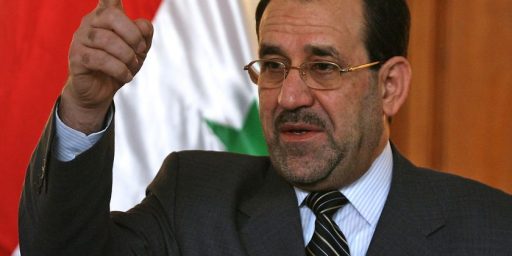Sunnis Join Iraq Constitutional Convention
Iraq President Averts Political Crisis (AP)
Iraq’s president averted a crisis Thursday by promising Sunni Arabs a big say in drafting the constitution — clearing the way for them to join a Shiite-dominated panel now working around the clock in a cavernous, dusty auditorium. Sunni Arab support is vital to the lawmakers who gather inside the most heavily fortified area of the capital, trying to ignore assassination attempts, death threats and suicide attacks as they wrangle over sensitive charter details and sometimes give way to shouted arguments.
Iraq’s 275-seat parliament has until mid-August to adopt a new constitution that hasn’t yet been written, must be acceptable to Iraq’s voters, and is expected to deal with the tough issues of role of Islam in public life and the type of electoral system Iraq should have. The document will face a nationwide vote two months later. If adopted, it will provide the basis for a new election to be held by December.
The AP headline and story lede is rather odd. The Sunnis were always going to have a big hand in the process. The Shiite leadership understood that from the beginning. The problem was that most of the Sunni parties boycotted the process, unwilling to be reduced to a level of political influence commensurate with their share of the population after decades of dictatorial rule. By boycotting the elections that created the interim government, they were technically not entitled to much say in the follow-on process. Regardless of that, the Shi’a have been working to get them a seat at the table.
President Jalal Talabani, a Sunni Kurd, responded Thursday to threats by Sunni Arabs to boycott the process unless they were given more committee seats, and unless their members were allowed to vote. “We have decided to add about 20 to 25 members from Sunnis in the committee, which will draft the constitution with full rights like other members who were elected by the parliament,” Talabani said after meeting British Foreign Secretary Jack Straw. “This will be done very soon and we are discussing to finalize the making of this decision.”
The latest move to lure the reluctant Sunni Arab minority into the political process came amid reports that the Iraqi government and U.S. Embassy were both engaged in backchannel negotiations designed to get the Sunni-dominated insurgents involved in the political process.
At the same time, the government has undercut ties with the Sunni community by supporting the Badr Brigade militia of the Shiites and the pesh merga of the Kurds. Only Wednesday, Talabani, speaking at a public ceremony, praised the militia as being the “heroes of liberating Iraq.”
The infighting over Sunni Arab participation has exposed the depth and danger of Iraq’s sectarian politics. With both government and parliament dominated by Shiites and Kurds — two communities that make up nearly 80 percent of Iraqis but had long been oppressed — the Sunni Arabs have grown more embittered.
The Shiites and Kurds have been embittered–not to mention murdered–for decades. Even so, they’ve been incredibly farsighted in understanding that “Iraq” can not be sustained without the support of the Sunnis.
One expects that the August constitution will recognize that fact by including some of the same protections that the U.S. Constitution of 1789 did to solve similar problems: Federalism with a high level of local autonomy on most issues; a bicameral legislature or other mechanism to balance the rights of the majority with those of concentrated minorities; and an independent judiciary. Given the makeup of the current interim government, one expects that there will be multiple vice presidents or prime ministers and some arrangement to ensure that all three of the major groups are represented in the cabinet.





I’m surprised they stopped at “political” crisis.
Why not the full-blown constitutional crisis like we have here every time we have an election nowadays?